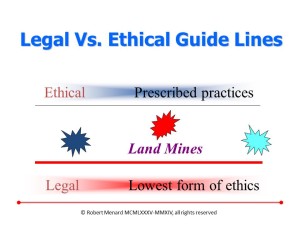What Does It Take to Succeed at the Purchasing Profession, Part Two

Robert Menard
Certified Purchasing Professional,
Certified Professional Purchasing Consultant, Certified Green Purchasing Professional, Certified Professional Purchasing Manager
Editor’s Note: This is the second in a six part series on how to succeed in the purchasing profession. Part One explores the overall view. Part Two explains the legal requirements. Part Three (link) focuses on negotiation, communication, and interpersonal skills. Part Four (link) plumbs the general business knowledge needed to excel, lead, and advance into executive management. Part Five (link) explores the character traits and Part Six wraps up loose ends.(link)
With some exceptions, work-a-day purchasing pros are surprised to learn that knowledge of the law is a requirement of their job. They are yet more surprised to learn that ethical behavior in purchase and sale transactions is the law. This legal requirement stems mostly from the Uniform Commercial Code (UCC), the governing authority for the purchase and sale of goods throughout nearly all of the United States.
For those who would like a short and entertaining quiz on purchasing law, click here
A great and essential addition to any professional buyer’s library is The Purchasing Manager’s Desk Book of Purchasing Law (Prentice Hall). I commend you to a thorough study of this exhaustive tome that covers our profession’s legal landscape. Among many other topics, it identifies the seven duties of an agent. In short these are, loyalty, obedience, reasonable care, account (to the principal), inform (the principal), confidence, and necessary education, skills, & training.
Note the last duty, that of bringing the necessary education, skills, & training to the agency. What is so stunning about this (aside from the fact that most buyers are ignorant all seven) duty is the wide-spread, almost universal lack of purchasing education and training. In research for my first book, You’re the Buyer – You Negotiate It, I discovered that the average sales person receives more education & training in the first year than the average purchasing receives in a career!
Much has changed in the past 25 years in terms of recognition of purchasing as the most efficient profit center in business but ours is a work in progress. Most influentially, the supply chain in general, and purchasing in particular is increasingly recognized as the single most efficient generator of profitability in all of business . As purchasing increasingly seeks or is thrust into the forefront of business, professional buyers cease to become functionaries. As leaders, it is incumbent on us to be conversant with a menu of competencies and purchasing law is high on the list.
Noted above is the requirement imposed by the UCC for ethical conduct in the purchase and sale of goods. I contend that ethical behavior extends to the purchase and sale of services too, whether inscribed in statute or required by good business practice.
For a quiz on legal conduct, ethical behavior, contract law, please click here.
 To conceptualize the difference between legal and ethical behavior, picture the politician in handcuffs mugging for the camera that, “I did nothing wrong”. He probably means illegal but that is always in doubt. I might cynically question if he did anything right but the better question is, “Did you violate any law or ethics?” Illegal action cannot be ethical, by definition. As the graphic show, legal conduct is the lowest form of ethics. Ethics is a cut above, a higher standard. If we do not scrupulously observe the demarcation between ethical and illegal, we fall into the land mine.
To conceptualize the difference between legal and ethical behavior, picture the politician in handcuffs mugging for the camera that, “I did nothing wrong”. He probably means illegal but that is always in doubt. I might cynically question if he did anything right but the better question is, “Did you violate any law or ethics?” Illegal action cannot be ethical, by definition. As the graphic show, legal conduct is the lowest form of ethics. Ethics is a cut above, a higher standard. If we do not scrupulously observe the demarcation between ethical and illegal, we fall into the land mine.
There is so much more to learn about law. In the interests of time and space, here are links to blog posts on the following topics.
Buyer/Seller Authority and types of purchasing authority in agency law
